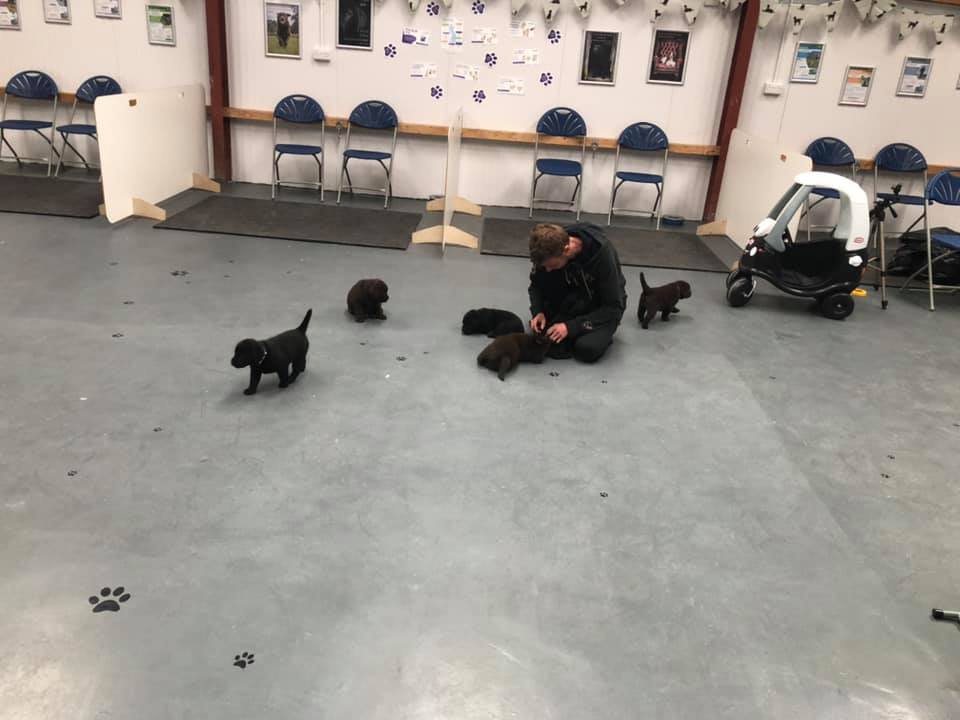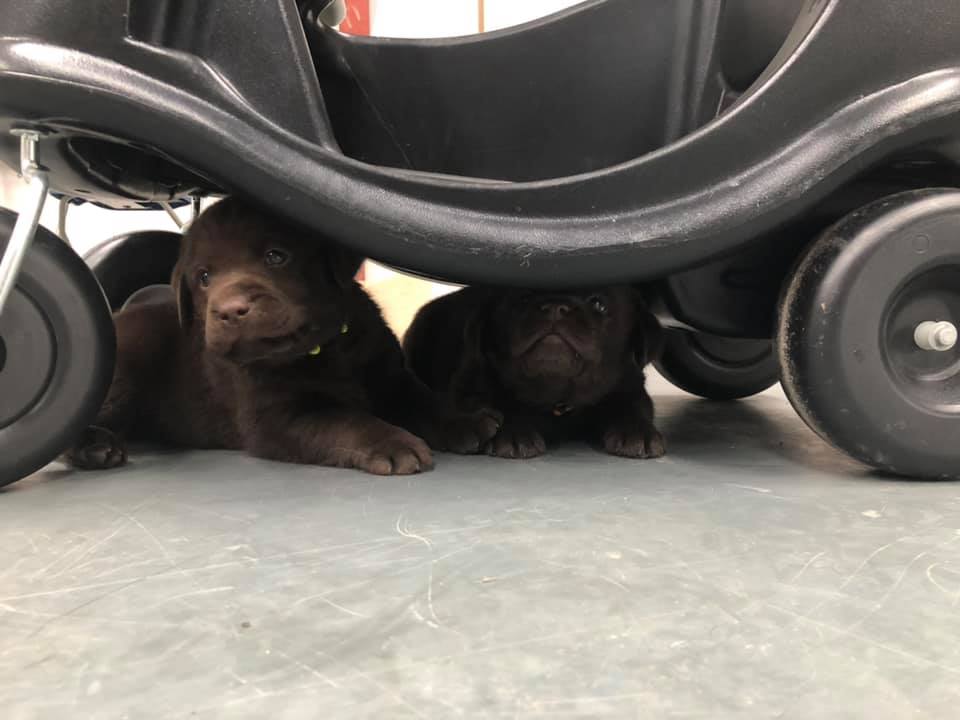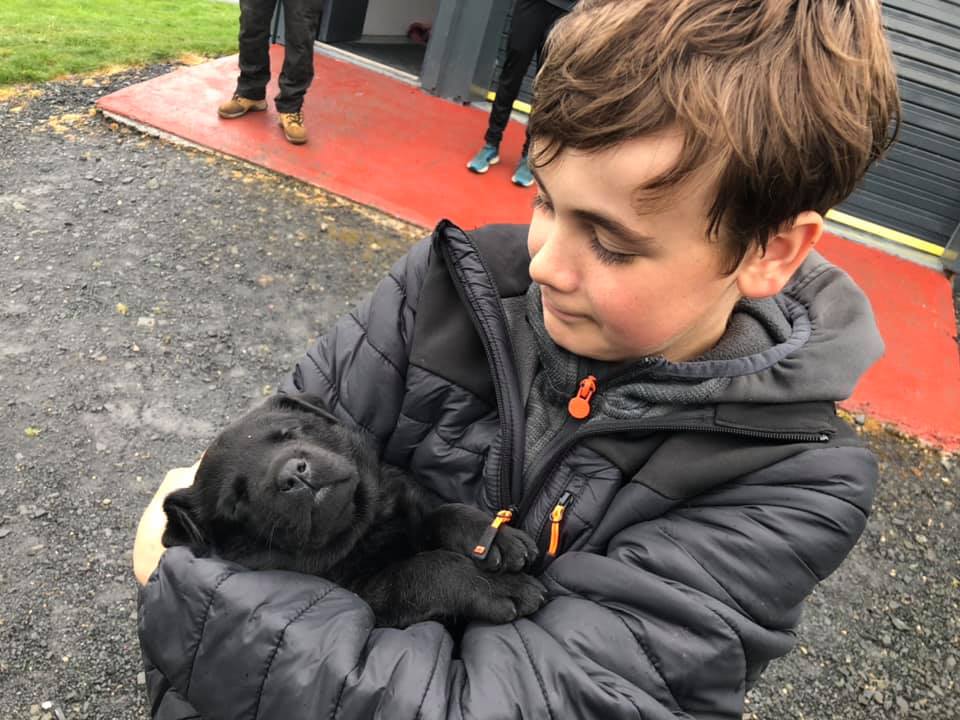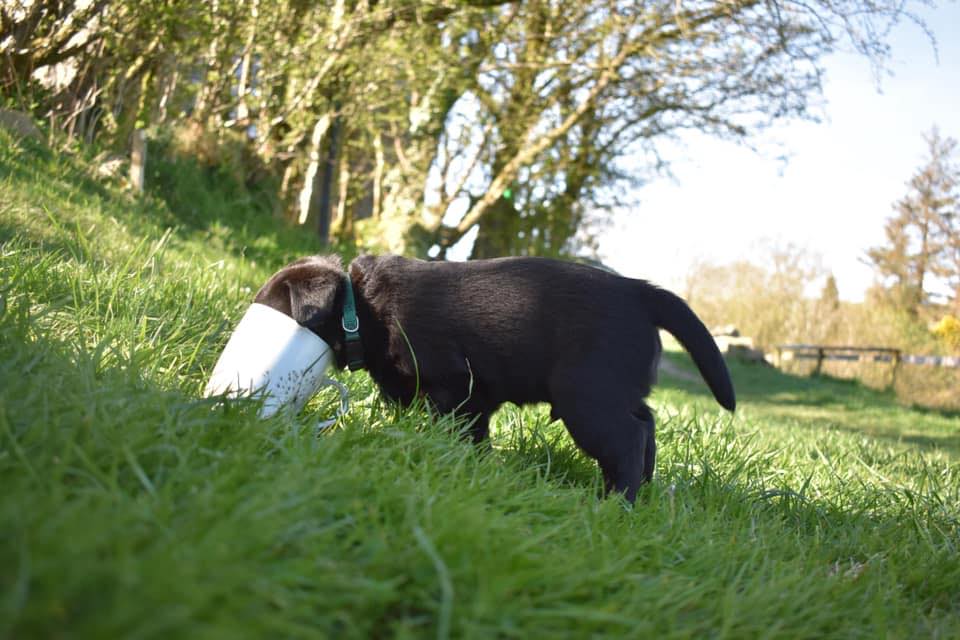At 5 weeks old puppies will go through what is commonly referred to as a short 'fear period' - where they may become more unsure of an object or situation that they were previously comfortable with. This has been quite noticeable with a few of Prue's puppies - some more than others.
As the puppies pass through this 'fear period' we are more cautious about triggering that startle recovery process. The puppies need only to experience very mild startles and they need to recover immediately. It is also important to continue introducing new and novel objects which we are continuing to do.
We have introduced the puppies to the great outdoors. The puppies have immunity from their mother that will last until they are approximately 8 weeks old so they are relatively safe to do this. Introducing the puppies to the outdoors, the smells, the surfaces - including grass is so important to young puppies. The puppies took it all in their stride and loved running through the grass!
We also took the puppies on a 'road trip' to the training barn as it hasn't been used now for over a month, and was heavily cleaned when we stopped the classes due to the Covid 19 virus. I particularly wanted to introduce the puppies to car travel, and wanted them to also experience a totally new environment. They all fell asleep in the car and then had a gallop around the barn before falling asleep again. I have attached some pictures below.
We are still following the puppy culture program which emphasises the importance of communication between dogs and people, calling this the Communication Trillogy. They advocate three exercises;
1. Introducing a marker or in our case a 'clicker'
2. Teaching puppies to offer behaviour to gain a response.
3. Manding - offering a sit behaviour to ask for attention/rewards.
Introducing these exercises can also support the development of impulse control, which is defined as the ability to delay gratification. Teaching the puppies to offer behaviours - teaches the puppies impulse control. For example a puppy that wants attention could obtain instant gratification by jump up to gain attention - or if it has been taught to offer a suitable behaviour like a sit for attention (Manding) then this becomes that default behaviour instead. Teaching these behaviours can also help to reduce frustration as the puppy know what to do to gain that all important attention it wants.
Many people worry that teaching a 'sit' behaviour to puppies will prevent them being showdogs in the future. This is simply not true - as I can testify from my previous litter. You just need to teach a stand behaviour too and then introduce commands (cues) so that the puppy understands the difference. Its a little extra work but well worth it!
We have already introduced the puppies to the clicker. Pairing the sound of the clicker with a small piece of chicken. Needless the puppies were very excited by the presence of the chicken and were not worried at all by the clicker. We have taught them all to sit via luring - they just need a bit more practise!!
As the puppies pass through this 'fear period' we are more cautious about triggering that startle recovery process. The puppies need only to experience very mild startles and they need to recover immediately. It is also important to continue introducing new and novel objects which we are continuing to do.
We have introduced the puppies to the great outdoors. The puppies have immunity from their mother that will last until they are approximately 8 weeks old so they are relatively safe to do this. Introducing the puppies to the outdoors, the smells, the surfaces - including grass is so important to young puppies. The puppies took it all in their stride and loved running through the grass!
We also took the puppies on a 'road trip' to the training barn as it hasn't been used now for over a month, and was heavily cleaned when we stopped the classes due to the Covid 19 virus. I particularly wanted to introduce the puppies to car travel, and wanted them to also experience a totally new environment. They all fell asleep in the car and then had a gallop around the barn before falling asleep again. I have attached some pictures below.
We are still following the puppy culture program which emphasises the importance of communication between dogs and people, calling this the Communication Trillogy. They advocate three exercises;
1. Introducing a marker or in our case a 'clicker'
2. Teaching puppies to offer behaviour to gain a response.
3. Manding - offering a sit behaviour to ask for attention/rewards.
Introducing these exercises can also support the development of impulse control, which is defined as the ability to delay gratification. Teaching the puppies to offer behaviours - teaches the puppies impulse control. For example a puppy that wants attention could obtain instant gratification by jump up to gain attention - or if it has been taught to offer a suitable behaviour like a sit for attention (Manding) then this becomes that default behaviour instead. Teaching these behaviours can also help to reduce frustration as the puppy know what to do to gain that all important attention it wants.
Many people worry that teaching a 'sit' behaviour to puppies will prevent them being showdogs in the future. This is simply not true - as I can testify from my previous litter. You just need to teach a stand behaviour too and then introduce commands (cues) so that the puppy understands the difference. Its a little extra work but well worth it!
We have already introduced the puppies to the clicker. Pairing the sound of the clicker with a small piece of chicken. Needless the puppies were very excited by the presence of the chicken and were not worried at all by the clicker. We have taught them all to sit via luring - they just need a bit more practise!!




 RSS Feed
RSS Feed
